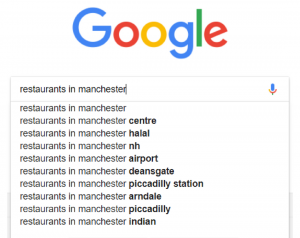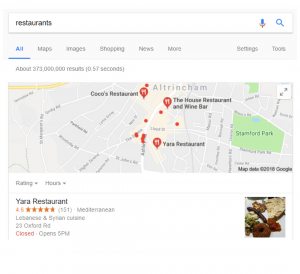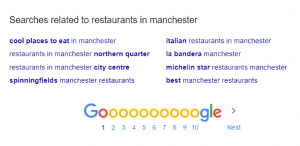Why Your Business Needs to Choose the Right Keywords
It all begins with the searcher. What will they type into a search box?
No matter how well-thought out your SEO methods are, if you aren’t using accurate keywords it’s completely useless.
 You must choose the right keywords. Spending time conducting keyword research is always time well spent. Keywords can determine your sites success or failure – if your chosen keywords aren’t resulting in any website traffic it’s pointless, but it’s equally as pointless if searchers who find your website aren’t your intended audience.
You must choose the right keywords. Spending time conducting keyword research is always time well spent. Keywords can determine your sites success or failure – if your chosen keywords aren’t resulting in any website traffic it’s pointless, but it’s equally as pointless if searchers who find your website aren’t your intended audience.
Choosing accurate keywords is crucial. It’s like having all the ingredients for a cake but with no oven to bake it – your efforts finding a domain name, writing content for each site page and developing your business online are all wasted, and no one can enjoy the end product, your website. All because you’re missing a vital ingredient, accurate keywords.
How do Search Engines Work?
Before we delve in to how to choose the right keywords, here’s a quick refresh on how search engine result pages, SERP, work.
There are other search engines like Yahoo and Ask, but Google and Bing are typically the primary focus. Search engines use software referred to as “spiders” to ‘crawl’ the Internet. Spiders constantly review web pages and rank them against similar content based on their relevance and popularity.

Say you’ve just launched a website for your restaurant in Manchester. Once your site’s running, Google’s spiders will index your page based on the relevancy of the keywords you’ve chosen: Manchester Restaurant, Book Manchester Restaurant, and so on.
When someone searches for ‘Manchester Restaurant’, Google recognises your site is relevant to the search terms and will display it in the results. SEO helps you to rank higher in SERP.
SEO may seem extremely confusing, but it isn’t very complicated once you get used to it. You don’t need to be a whizz to optimize your own site. Simple strategies will help you achieve your target traffic, within reason, of course.
5 Musts When Choosing the Right Keywords for SEO
1. Consider Long-Tail Keywords
Long-tail keywords are longer, specific keyword phrases (more than 3 words). They focus on targeting niche demographics instead of a mass audience.
– They’re very specific – it’s likely you’ll rank highly on SERP on relevant searches
– Often less competitive – they’re specific and they aren’t generic
– Higher click-through-rate – it’s likely you’ll have less competition, so searchers (searchers) have less options, making them more likely to click on your ad
– Highly targeted – your keyword phrase is likely to attract your target audience
2. Do Your Research
To optimize your website, you have to do your research.
We suggest creating a list of topics relevant to your business. What do you blog about? What to do update the most? What brings the most traffic to your website?
Use your list of topics to select keywords
Write down a list of words and phrases. It doesn’t matter how long your list it, you can eliminate words or phrases later on.
3. Don’t Be Too Generic
You need to get a balance – singular words are usually popular, and you’ll have a tough time ranking highly since it’s so competitive. But at the same time, you don’t want your keyword phrases to be so specific that only a handful of users will type them in a search box.
Quick Tip: look out for related search terms. Scroll down to the bottom and see related searches. They’ll be similar words / phrases so add them to your list of keywords.
4. Region Specific Keywords
 There are plenty of local opportunities that you shouldn’t miss out on – help customers in your surrounding areas find you by ensuring your business is located on Google, Bing and other search engines you intend to use.
There are plenty of local opportunities that you shouldn’t miss out on – help customers in your surrounding areas find you by ensuring your business is located on Google, Bing and other search engines you intend to use.
Take advantage of this particularly if you’re business is an actual place for your audience to visit. Like a hairdresser, restaurant, coffee shop …
5. Use One Term for One Page
Don’t confuse search engines with loads of keywords – give your page a singular purpose. Decide on one phrase or word that you want your page to be found for.
The Bottom Line
Most importantly, remember it’s your audience who will be searching for your page, not you or a member of your team. You can’t assume they’ll know exactly what to type to find your page. Don’t be so specific so 1% of your target market will search with a term relevant to you, or too generic that you’ll have so much competition your page will rank on page 5 of SERP.
High volumes of traffic to your website won’t happen overnight. If you’re optimizing your website yourself, it’s important to understand SEO and the best practises. If you want to learn a bit more about SEO, check out our ‘Complete Beginners Guide: What is SEO?’
If you’d like help to choose the right keywords that will increase your website traffic, contact Different Gravy Digital now.
0161 706 0004
mg@differentgravydigital.co.uk
About the author:
Marie Harwood is a Digital Marketing Assistant at Different Gravy Digital, Hale, Cheshire.
Different Gravy Digital are a full service Digital Marketing Agency operating in the Hospitality & Leisure, Financial Services, Legal & Property sectors. Products and services range from; 3D & 360° Tours, Website Design & Build, Social Media, Video Production, Search Engine Optimisation (SEO), Content Creation, Email Marketing, Online Feedback / Review Systems and Paid Advertising (Google, Bing and Social Media).
Contact Details:
marie@differentgravydigital.co.uk
0161 706 0004
120a Ashley Road, Hale, Altrincham, Cheshire, WA14 2UN
